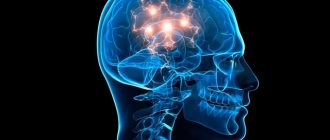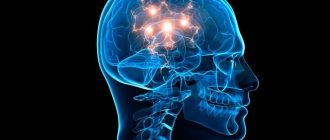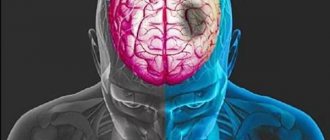Thanks to many years of studying our insides at every opportunity, scientists have a good understanding of how almost every part of our body works. However, the most mysterious part of our body is the brain. And the more we study it, the more mysterious it becomes. You can’t even imagine what amazing things our “thinking machine” is capable of. Don’t worry, scientists didn’t know this for a long time either.
Superhero brain.
Today we will talk about 10 of the most incredible capabilities of our brain that make us almost superheroes.
The brain can create false memories
Fool me.
Here's a scientific fact: our brains are capable of creating fake memories. Have you ever found yourself in a situation where you remember something even though it never actually happened? No, we are not talking about memories of past lives where you were Caesar or Cleopatra. What we're talking about is that you "remember" doing things that you didn't actually do. They thought they borrowed money from a neighbor, but in fact they didn’t. They thought that they bought some thing, but in fact they did not buy it. There are a lot of such examples.
There are also more impressive ones. For example, our brain may convince us that we have committed a crime. In one experiment, scientists were able to instill and create false memories in 70 percent of participants. They began to think that they had committed a theft or an armed attack.
How it works? It is believed that our brains may fill in gaps in our memory with inaccurate or completely unreliable information when we try to remember something.
Also interesting to read: Bad smells make memories stronger
Are superpowers dangerous?
— There is a common idea that the brain has some superpowers hidden in the subconscious. Is this really true?
— The role of the ideal in the functioning of the brain should not be overestimated. This is where myths arise about his superpowers and hidden reserves - they say that a person in ordinary life supposedly uses only a small fraction of what is actually under his control. Who, for example, has not heard the story about a passerby who, fleeing from a dog, climbed over a three-meter wall, although he had never before or since been able to climb even over a two-meter one... There are plenty of variations on this theme. The finale usually concludes that each of us has a lot of unrealized potential, and if we could learn to use them... Well, it’s not difficult. Give yourself a dose of doping and go for it. Most likely, you will die on the second try...
Such ideas are similar to the myth of the conquest of nature. Yes, the body has reserves. But they are reserves because they are reserved for rare, truly extreme cases. A person can do a lot, but not everything - at the same time, one has to pay for achievements, sometimes too high a price...
Article on the topic
Living supercomputer. Why does the brain need water and why is it more active at night? For example, there is a theory that real muscle strength is many times greater than what we show in competitions. The situation is the same as with ultra-modern, super-powerful cars, in which the speed is artificially limited. Limitations on muscle strength occur due to fragility of bones and insufficient strength of tendons. Why are there endless stories about jumping and incredible strength? Yes, because at the moment of danger a huge dose of adrenaline is released in the body. The body is cleverly designed. He understands that when, say, a tiger attacks, it is not the time to think about the correct distribution of energy, and sprained ligaments can be repaired later. But when the untapped capabilities of the brain are discussed (supermemory, superfast counting and other phenomena), boring ideas about natural barriers are immediately forgotten.
The whole question here is the price of superpowers. It is known that almost all Olympic champions are sick people. Their records are associated with the exorbitant mobilization of the body’s forces: this does not go in vain. The price for a medal at 18 is often disability at 40. A person works hard without thinking about the future. Or, let's say, there are people who never sleep: oddly enough, they are not allowed to drive a car. They compensate for the lack of normal sleep by falling asleep for a second or two. And in a second, by the way, a car can travel tens of meters...
By the way, superpowers in themselves are not always a good thing. Let's take, for example, the same memory. Storing huge amounts of information in your head instantly and forever is amazing. But the ability to forget is also a great thing. Imagine that one of the spouses remembers all the family scandals, psychological traumas, and defeats. It's hard to live with such a memory. The great detective Sherlock Holmes avoided unnecessary knowledge. Everyone who works on a computer faces a similar problem: a 500 gig disk can be filled very quickly, but how can you then find the file you need? Those who remember everything often have little use: they are overwhelmed with information.
Charging for the head. What exercises will help pump up your brain? More details
So far, most cases of extraordinary human ability have led to losses in the future or even the present. Almost any deviation from the stability of the human body does not lead to good. Hence the conclusion follows: superpowers, in theory, should be prohibited at the biological level - by the desire of the brain and the body itself for balance. Therefore, the brain introduces quite strict restrictions into our thinking, just as it is impossible to play a fast melody in the bass register.
Superpowers are dangerous for their owner. Let's take the life and death of Vladimir Vysotsky, who undoubtedly had superpowers, but they “burned” (literally, if we talk about energy) his body. Or, say, the fate of Pushkin, Lermontov... If the price for developing one’s abilities and skills within normal limits is training and a healthy lifestyle, then the price of superpowers is the hypertrophy of one quality at the expense of others and, possibly, premature death.
Article on the topic
Super Elder.
What miracles did Grigory Rasputin perform? — If the brain is not fully studied, then it is impossible to deny it some kind of paranormal abilities?
“I think the time will come to study phenomena that are now considered non-existent: the phenomenon of precognition, the exit of the soul from the body, the possibilities of telepathy, prophetic dreams. For example, telepathy: is it there or not? One thing is clear: the transmission of thoughts over a distance would make the existence of highly developed life forms impossible. And the so-called exit of the soul from the body occurs only in critical conditions, for example, when a person is dying. Why? When life fades, the coordinated work of various systems is disrupted. They are barely enough for self-sufficiency, but no longer for interaction. And then, perhaps, some prohibitions and restrictions cease to operate in the brain... For some people these are innate qualities (in this case we are talking about talent or even genius). They can manifest themselves, for example, when setting a super task in the form of insights and are accompanied by a change in the internal time regime.
— So time flows differently in the brain?
- Perhaps so. In particularly complex structures, energy can transfer into time or space and vice versa. In other words, it is possible that the brain in its volume is capable of changing the laws of space-time. Theoretically, one can imagine how a complex neural network (a set of billions of neurons) locally, in the volume of the head, modifies the properties of space depending on its structure and state.
Article on the topic
Breakthrough or profanation: how will a Russian programmer have his head transplanted?
Our brain can predict the future
Agility.
It has been found that there is a delay when visual information enters our brain, allowing us to predict what is going to happen next. These predictions are based, among other things, on our past experience (a ball is flying at us - we need to dodge; an open road hatch - we need to go around). We don't even connect our consciousness to it (in other words, we don't think about it). All people are able to predict the future, which helps us avoid those things that can harm us.
Unbelievable but true
Scientists have collected information that speaks about the phenomenal abilities of the human brain, namely:
1. The brain is considered gray. However, only dying cells turn gray. Living cells glow pink!
2. The organ works without rest from birth to death.
3. The organ contains 80 to 100 billion neurons. The left hemisphere contains more neurons.
4. According to information published in 2014, a woman’s head contains more “gray matter.”
5. Men have more white cerebrospinal fluid.
6. People with a humanitarian background have a higher percentage of “gray matter.”
7. Systematic physical exercise helps increase brain mass.
8. 60% of the brain is white matter, its color is determined by myelin, which increases the speed of electrical impulses.
9. Fat is very good for the brain.
10. The organ consumes up to 20% oxygen and needs the same amount of glucose.
11. The organ produces energy that can power a 25W light bulb!
12. It was found that organ size does not affect mental abilities.
13. The more convolutions, the more neurons, the better the memory.
14. You can increase the number of brain convolutions with the help of meditation.
15. When the process of yawning occurs, the organ cools down.
16. If a person neglects sleep, the temperature of the brain rises.
17. A person can process 70,000 thoughts per day.
18. Information in the organ moves through neurons at a speed of 1.5 to 440 km/h.
19. The organ is capable of instantly scanning and processing images in 13 milliseconds, while the blinking of the eye occurs in several hundred milliseconds.
20. According to statistics, approximately 20% of the population is left-handed. A right-handed person is most adapted to the conditions of civilization. People with left-handed ability have a harder time living.
21. Only 1% of the population can use both hands equally; they are called ambidexters.
Our brain “sees” 360 degrees
The brain can see better than the eyes.
And this opportunity makes us like Spider-Man. Yes, we, or rather our brain, are capable of very carefully monitoring our surroundings and reporting what we have not yet fully realized. For example, we begin to feel that someone is watching us. A feeling of awkwardness appears, we begin to sweat, and the skin becomes covered with goosebumps. We turn our heads in this direction, and we actually see that some person is looking at us. Some people call it the “sixth sense.”
We don’t have eyes on the back of our heads, and our field of vision is quite narrow compared to other animals. But the brain doesn’t need them there. It has a more effective means of assessing the environment. For example, hearing, which is capable of noticing even the most minor changes in the surrounding background. And this ability is especially enhanced when we cannot see part of this environment.
Cognitive technologies
Cognitive technologies reflect the processes of human cognitive activity. The principle of the human brain is used in artificial intelligence systems. An example is video cameras that are installed along the highway to monitor the faces of car drivers. Artificial intelligence systems are able to determine in a split second that the driver looks tired and is about to fall asleep.
Such innovations are designed to reduce the number of accidents on the roads, which in most cases occur due to the fact that a tired driver has lost vigilance and the ability to concentrate. Another example of cognitive technology is compact video cameras that are mounted on the shoulder of visually impaired people.
The system scans the surrounding space, determines street names and house numbers, voicing information to the owner, which allows a blind person to navigate the city streets without an accompanying person. The cognition of machines and electronic devices is associated with the characteristics of the human brain.
Artificial intelligence systems are capable of perceiving information, processing and analyzing data, drawing logical conclusions, and self-learning. Cognitive technologies are the most important achievements of our time. Cognitive science combines knowledge from different fields - philosophy, psychology, neurophysiology. The picture of reality within the framework of cognitive science is presented in the form of measurements:
- Objective universe.
- Subjective image within the objective world.
- Interaction between reality and representation (secondary subjective representation of reality).
The relationship between actual reality and ideas about it reflect the adaptive abilities of the individual. In terms of adaptation to environmental conditions, the degree of its adequacy is of great importance. Cognitive science is the body of knowledge and technology used to enhance the capabilities of our brains.
A distinctive feature of technology is its social and practical benefits. An example of the use of cognitive technologies is the formation of virtual reality in the process of professional training of drivers, pilots, astronauts, and dispatchers.
Our brain can accurately assess any person in a split second
Creativity is not for everyone.
The brain has a very good sense.
No matter how unbiased we try to seem to ourselves, our brain has its own idea on this question. He is able to evaluate the person you meet for the first time in just 0.1 seconds (how he looks, how he speaks, how he is dressed, shaved, and so on). While we are trying to consciously understand all this, our brain on a subconscious level is already creating a picture of a person (and a fairly accurate one at that) and drawing a conclusion whether you will like this person or not.
What is IQ
IQ is the intelligence quotient adopted in 1912. It is determined by solving test problems, each of which should be different in complexity.
1. IQ 70 is the lowest.
2. The IQ of an ordinary person is 100.
3. An IQ score above 100 determines a person’s increased abilities.
For example, the average Japanese IQ is 111. Only 10% of Japanese have an IQ of 130.
Is it possible to increase your IQ level? American doctor Andrea Kuszewski, at the beginning of her career, worked with a mentally retarded child. She developed a program that ran classes for three years. As a result, the child’s IQ after completing the course was 100.
After the experiments, the following conclusion was drawn:
• mental abilities can be trained;
• you can start training at any age;
• anyone can improve their abilities.
Where to begin?
A person uses approximately 5% of the brain's capacity, or 10% at best.
This body has protection that allows you to use the opportunities for as long as is currently required.
There are several rules for those who want to increase their IQ level:
1. Steadily “feed” your mind with healthy food. You can solve mathematical or logical problems, master a musical instrument or study foreign languages, explore countries while traveling.
2. The best way to train (for some) is computer games.
3. Extraordinary abilities are developed by solving one problem using several options.
4. Complex solutions to any problem should be chosen.
It has been proven that you need to develop mental abilities under stable loads. You can start by solving simple problems. In other words, go from simple to complex:
• solve crosswords;
• read books, newspapers;
• learn poetry;
• solve mathematical problems;
• remember information read;
• study languages;
• master a computer that helps you control your own emotions.
It doesn't take much time to complete these loads. Just half an hour a day is worth spending on exercise to maintain adequate brain activity until old age. It is necessary to improve the abilities of the human brain at any age.
As a result, after such classes a person receives:
• blood circulation will improve, that is, brain nutrition;
• the result of training promotes unlimited perception of information;
• the risk of developing age-related diseases or diseases like depression will significantly decrease.
Interesting! A sign of concern should be deterioration in memory. In such a situation, computer games can be recommended. It has been noticed that people who play computer games remember information better, and they also have a high reaction speed. It is the speed of reaction to an unusual situation that can reflect the state of brain activity.
Our brain is the perfect alarm clock
The brain will wake itself up better than any smartphone.
“I don't need an alarm clock. “I am my own alarm clock,” some people say. Know that they are not joking. If you keep a routine (go to bed and get up at the same time), your brain gets used to it. Our own biological clock is better than any alarm clock. Therefore, many people may wake up before the dreaded bell rings, signaling that it’s time to get up for work. This is often observed, for example, among office workers.
Nutrition
It’s not just those who play sports or are trying to lose weight who need to watch their diet. Every person needs to control their diet. The correct selection of food products improves metabolism, normalizes weight, strengthens the immune system, increases physical abilities, and also has a positive effect on a person’s intellectual skills.
The first important condition for proper nutrition is to consume enough fluid. If a person lacks it, then brain function will be significantly deteriorated. To avoid this, you should drink about 2 liters of water every day. This will increase intelligence and speed of its work.
The second condition is the nutrition itself. What to include in your diet:
- Greens – folic acid and vitamins contained in greens are very useful for intellectual activity;
- Apples – quercetin, which is part of apples, protects brain cells from any negative effects, and also prevents the decline in cognitive skills;
- Milk – many components make milk very useful for improving memory and mental skills;
- Fish – the presence of this component in the diet increases intellectual activity and also strengthens memory;
- Nuts - protein increases the protection of brain tissue from external influences, which improves cognitive function;
- Chocolate - glucose increases brain activity, dramatically improving all cognitive abilities of a person.
You can also unlock the full inactive potential of the brain with the help of eggs, liver, citrus fruits, legumes, honey or coffee. At the same time, it is not recommended to eat junk food (fast food, fatty, fried) and drink alcohol.
Some people prefer to increase their brain potential through medical means. One of the most popular was “Theanine” from.
Our brains can “listen” and learn while we sleep
Would you like to study in your sleep?
We are used to thinking that during sleep our brain completely switches off. Actually this is not true. Yes, some parts of the brain really rest, reducing their activity. But, we can even learn in our sleep! During the so-called REM sleep phase, a person is able to remember certain things. During experiments, scientists played certain sound signals (which people had never heard before) in front of sleeping people. Then the people woke up, and the researchers played the signals again and asked them to say which of the sounds sounded familiar. And people recognized them!
It's a cool ability, but we don't recommend using it for homework, tests, or important presentations.
Also interesting: Electrical brain stimulation temporarily rejuvenates the human brain by 50 years
Features of work
Many scientists are of the same opinion that the capabilities of the human brain are limitless, but have not yet been sufficiently studied. There are many examples that prove that the brain's capabilities have no limits. Liz Warlow is a musician with a symphony orchestra in London, plays the viola, and has been playing music since she was 8 years old. Moreover, the woman is deaf. Her hearing began to deteriorate when Liz turned 16. At the age of 19, she stopped hearing completely, which did not stop her from continuing her career as a musician.
This is one example of successful adaptation to changing conditions. Research by neuroscientists shows the possibility of increasing the number of synaptic contacts through learning. Consciousness determines the possibility of achieving a goal with the help of purposeful mental activity. Mentally imagining images of objects, imagining the desired events, a person brings the moment of implementation of his plans closer and achieves the most incredible goals.
A thought is an energy flow that arises in a neural network during the transmission of signals between neurons. Goal-oriented thinking is associated with obtaining the desired result, as a feature of interaction with others. In the process of mental activity, an individual relies on the following aspects:
- Modeling, planning.
- Experiment, forecasting.
- Causality, assessment.
- Analysis, intellectual processing, comparison of information with information stored in memory.
- Judgment, conclusions.
Skills that influence the ability to think include the ability to quickly find the necessary information in memory, compare different data, and draw logical, well-founded conclusions. Intelligence refers to the ability to perform tasks such as reasoning, planning, understanding problems and ideas, abstract thinking, learning, and language skills.
Quickly calculating the correct answers without experience in solving similar problems is an indicator of high intelligence. An individual indicator of intelligence is reflected in the IQ value, which is determined using special tests. IQ tests measure a person's cognitive abilities, his ability to understand, master, remember and apply new information.
The unlimited capabilities of the brain are manifested in its influence on the health and quality of life of the individual. An example of the influence of brain structures can be seen in the so-called placebo effect. A person is given a pill consisting of a physiologically inactive substance, calling it an effective cure for the disease. If a person believes in the miraculous properties of the medicine, his condition improves.
The hidden capabilities of the brain are not fully understood. Scientists only unequivocally state the strength of its influence on the body. Psychosomatic diseases are a consequence of depression and emotional experiences. If mental activity is impaired, the entire body suffers, which manifests itself in disruption of the functioning of organs and parts of the body. For example, memories of an injury to a limb lead to a feeling of weakening of the muscles in that limb. A person cannot move his arm or leg, although he has long since recovered from the injury.
The supernatural capabilities of the brain are illustrated by examples of high-speed counting, when a person instantly performs the operations of multiplying and dividing multi-digit numbers in his mind. Polyglots, people who can learn many languages, also serve as an example of the limitless capabilities of the brain.
The incredible abilities of the human brain are reflected in skills such as speed reading, when a person reads a book volume consisting of hundreds of pages for a few minutes, or photographic memory - the ability to remember and reproduce information placed on a sheet of paper after looking at it once for no more 1 minute. Brain abilities can be developed by regularly setting yourself intellectual challenges.
The brain can learn through imagination
Creativity is not for everyone.
A simple experiment first performed more than 100 years ago. People were divided into two groups. One group was taught basic piano skills using the instrument. The other group was taught without a piano. People were simply told how to place and move their fingers correctly, and also described how a particular note sounds. By the end of the training, it was determined that both groups had the same skills - both were able to play the tune they were taught on the piano.
In the 1990s, using more modern scientific tools, scientists actually discovered that imaginary learning and practice can have the same effects on the brain as real ones.
Physical activity
Physical activity is the key to good health. It also helps increase intellectual abilities and expands the brain's potential, allowing a person to become much more intelligent. To do this, it is enough to regularly load yourself physically.
What physical activity is effective:
- Walking. Regular walks are very beneficial for your health and brain. It is best to walk outdoors in the evening or during the day when the sun is shining brightly. It is recommended to walk for at least half an hour.
- Yoga. The physical practice called yoga is also a type of activity. It develops cognitive skills and opens up new boundaries for a person, making it possible to further expand their potential.
- Aerobic exercise. Performing aerobic exercise has a direct effect on the hippocampus, which helps develop intellectual abilities, opening up new possibilities.
- Power training. It is recommended to exercise in the gym with the generally accepted regularity, because... this stimulates the protection of brain neurons, which has a positive effect on intelligence.
- Golf. Anyone who wants to maintain their physical condition or develop their intellect should play golf. Before hitting the ball, you need to calculate its strength, angle of inclination, and also calculate the trajectory of its flight. It is these factors that become the main argument in unlocking potential.
There is no need to limit yourself to this list. You can choose other sports or active dances based on personal preferences.
The brain works much better if pleasant music is played during training.
Our brains are in "autopilot mode"
Have you ever felt like you were on autopilot?
As soon as we master a skill well, our brain connects a certain department to work, the so-called passive mode network. It is used to perform tasks that do not require complex analysis, since their solution has already been tested many times and brought to automaticity.
People were taught a card game that required little thought. People played well, but when, after numerous games, this same passive mode network came into play, they began to play even better.
Learning other types of skills is more difficult for people. For example, playing instruments. At first it is very difficult. But after, when your hands and fingers remember how to play correctly, your brain actually turns off. And you start doing it automatically.
Kim Peek and Solomon Shereshevsky
Solomon Shereshevsky came under the supervision of psychologist A. Lurie when he was quite a young man - and his memory was phenomenal without any training. His way of “saving” information is similar to the mnemonics techniques known today. It seemed that the volume of his memory was not limited by anything. His only problem was learning to forget.
This man had so-called synesthesia. In all other respects, S.V. Shereshevsky remained quite ordinary. The situation is not the same with Kim Pik - he was born with certain disorders, which, however, in themselves should not have made him either a genius or a patient. However, already at 16 months the child learned to read, by the age of three he had mastered newspapers, and by the age of seven he had memorized the Bible. The books of Daniel Tammet (who, like Kim Peake, is a “savant”, but is much more social and, unlike others, can explain exactly how he makes calculations) do a good job of describing the capabilities of the human brain.
Kim Peak kept in his head maps of American cities, hundreds of pieces of classical music, and remembered several thousand books he had read. All this was not just “dead weight” - he understood the information in his memory, could interpret and use it.
In 2002, he began playing the piano, scoring many pieces from memory. It was he who inspired Barry Levinson to make the famous film Rain Man.
Our brain is able to build muscle in our body
Imaginary workouts, that's what they are.
It's summer now and many of us are probably again sighing bitterly about the fact that we couldn't prepare for it. All these diets and fitness centers remain our desires and memories. Do not despair! Our brains have the ability to increase the strength of our bodies if we just think about it.
In the experiment, one group of people was asked to imagine for 11 minutes every day (for 5 days) that they were working on improving their hand strength. By the end of the experiment, it was established that the group of people who thought about pumping up their arms had twice as much grip strength as those who did not.
Is it possible to get six pack abs using the same method? You won't know until you try.
Brain stimulation
To “stir up” brain activity, you need to tackle an interesting problem. Stimulation can begin with the speed reading technique:
• you need to study consistently for 3-4 months with a high emotional mood;
• be sure to understand the essence of what you read;
• expand the field of view of the text gradually.
In the second half of the twentieth century, the Bulgarian psychologist Georgiy Lozanov proposed a method of high-speed learning for adults. The method is called suggestology. Training takes place to music. The student, without straining, remembers new material 50% more compared to regular training.
You can start training at any time. Regular exercises, with a gradual increase in loads, will allow you to achieve good results:
1. Reading promotes the development of logical thinking.
2. Sports promote the production of endorphins, which stimulate brain activity.
3. Alternating between classes and daytime rest promotes better assimilation of information.
Scientists believe that everyone can take advantage of this opportunity to train their own abilities in order to improve attention, judgment and become simply smarter. You just need to dedicate every day to learning something new.
To maintain health, you should not use for stimulation:
• narcotic substances;
• alcoholic drinks;
• smoking cigarettes.
Any of the above methods causes degradation.
Phineas Gage: "the man with a hole in his head"
In the mid-19th century, an incident occurred that scientists and doctors still have not been able to explain: builder Phineas Gage survived after receiving a severe wound and losing part of his brain after a metal crowbar pierced his head. At that time, Gage was 25 years old.
The pin entered below the left eye and exited the body, flying several more meters, leaving the young construction worker without a good part of his brain. However, he did not die. Moreover, he soon regained consciousness and was taken to a doctor at the nearest hospital. The doctor applied a bandage and cleaned the wound of shrapnel - that was all that medicine of that time could offer. People were sure that Phineas Gage would die.
After some time, a bacterial infection developed and mold grew. However, after about 10 weeks, the patient recovered - he retained his memory, clear consciousness and his professional skills. Phineas Gage died in 1860, and this amazing case has never found a clear explanation.
Where does happiness live?
So, we can all create our own reality. Then why are not all of us happy? It turns out that not many people know how to create a happy reality and even have little idea of what they need for happiness - even when we get what we want, we are not so happy about it.
What is needed for happiness:
- work at a job you love;
- give of oneself to others and develop close relationships;
- set worthy long-term goals;
- be open and emotionally flexible;
- take into account the lessons of the past, but live in the present;
- experience unity with nature; get enough sleep;
- develop your body.
What not to do to achieve happiness:
- do not put off happiness for the future;
- do not associate happiness with external rewards and fleeting pleasures;
- don't wait for someone to make you happy;
- do not be closed to new things;
- not to be afraid, but also not to ignore signals of internal anxiety.
The Perfect Brain Solution: Self-Healing
The connection between mind and body is undeniable. Accordingly, many diseases are associated with the psyche. And we must also look for healing in the psyche, or rather, in a healing lifestyle, including: reducing stress, adequate sleep, physical activity, a balanced diet, giving up alcohol and nicotine, strengthening the connection between the mind and body.
Trust the body, it knows on a subtle level where the malaise appears and sends signals; they should not be feared or suppressed, they should be listened to. Become your own placebo - believe in the possibility of healing, adjust your mental health positively, stop mentally feeding your illnesses.








